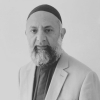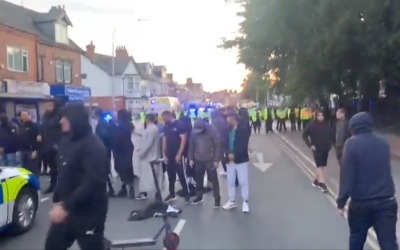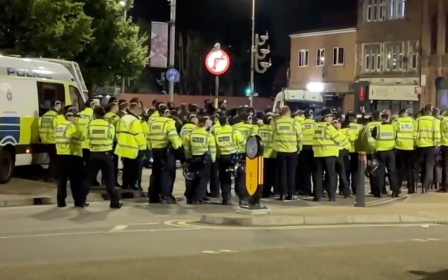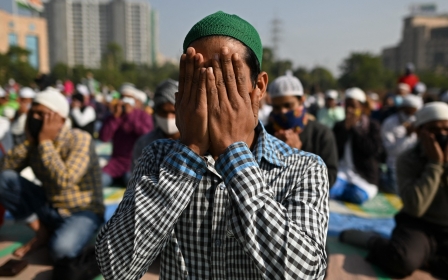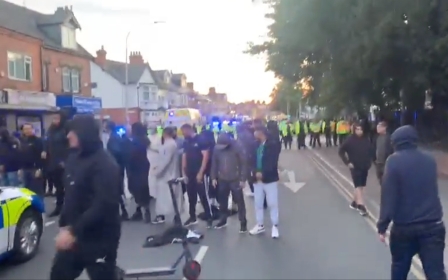Leicester riots: Muslims and Hindus must come together to quash Hindutva extremism
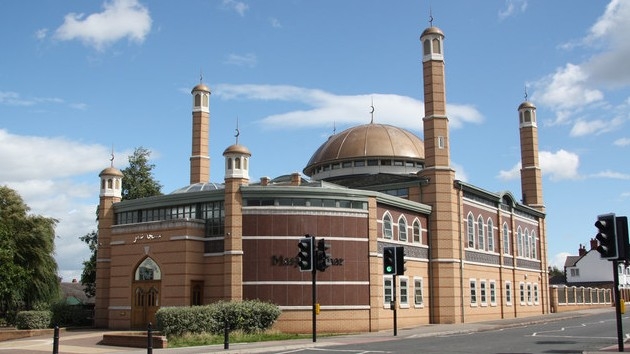
In recent months, the British city of Leicester has witnessed extremist Hindutva chanting and racist attacks against members of the Muslim community. This past Saturday, around 200 masked Hindutva men again took to the streets, even after police earlier this month were authorised to exercise dispersal and stop-and-search powers.
Leicester is home to tens of thousands of Muslims and Hindus, many of whom trace their origins to Africa, mainly Uganda, Kenya and Malawi. This common heritage has fostered respect between Muslims and Hindus in the city, allowing Leicester to become a model of multiculturalism.
They have deliberately provoked Muslims by marching in front of Muslim shops, homes and mosques
For me, someone who has lived in Leicester for more than 40 years, the terror on the streets today does not stem from the vast majority of Hindu residents. Thousands of Muslims play, attend school and carry out daily engagements with Hindus. I was fortunate enough to have once had a business partnership with a Hindu, and like many others who provide public services, I am in daily contact with my fellow Hindu residents.
With such close ties between the two communities, it is not uncommon to know a Muslim in Leicester who has a Hindu friend. Admittedly, there have been instances of disagreement - but these rarely last beyond a few days, and they do not lead to physical attacks.
Today, however, several domestic and international factors have empowered the far-right Hindutva movement.
New MEE newsletter: Jerusalem Dispatch
Sign up to get the latest insights and analysis on Israel-Palestine, alongside Turkey Unpacked and other MEE newsletters
This movement is part of an Indian nationalist, neo-fascist faction that believes in the superiority of the Hindu people. Outside of India, the ethos of RSS is promoted by Hindu Swayamsevak Sangh (HSS), which is estimated to have links to 150 countries, including many branches in the UK.
The UK wing of HSS was in 2015 investigated by the Charity Commission after one of its teachers was shown saying, "the number of good Muslims can be counted on one finger”, and that “to destroy Hindu history is the secret conspiracy of the Christians”.
Deepening divisions
Domestically, competition over government funding for different faith or cultural groups has placed a wedge between communities in Leicester. Such divisions are further widened when newcomers, in this case from India, migrate to Leicester. As they build their lives, they might come to view the established Muslim community as privileged.
Yet, such differences exist across and between other communities in Leicester, without leading to violence. Indeed, the recent Hindutva mob violence reflects the importation of right-wing extremist ideology from India.
Tensions have been building amid a series of violent confrontations over the past few months. In May, a young Muslim man was beaten with baseball bats wielded by members of a Hindutva mob. In August, after a cricket match between India and Pakistan in the Asia Cup, footage emerged of a throng of Hindu fans chanting “Death to Pakistan”.
Days later, in retaliation gangs of men stormed through Hindu areas of Leicester, attacking people, property. In another case this month, a young Muslim man was attacked by a mob after first being asked whether he was Muslim.
Then came the incident this past Saturday, with around 200 Hindu men marching through a Muslim area of the city’s east, while a Hindu temple was vandalised by an unidentified man dressed in black who pulled down the saffron flag outside the temple. The continued escalation of violence has raised fears over what could happen next, with incidents also reported in Birmingham.
Spreading xenophobia
The extremist Hindutva ideology has become increasingly brazen since the RSS-affiliated Bharatiya Janata Party (BJP) came to power in India, headed by Prime Minister Narendra Modi. As champions of the Hindutva ideology, Modi and his party have been at the forefront of marginalising and targeting Muslims across India.
Today, with the spread of RSS chapters in the UK, the fundamentalist Hindutva movement has been exploiting economic disparities and the management of communities in the UK to spread its xenophobic and racist ideology here.
The violence in Leicester has national purchase, with members of the extremist Hindutva movement coming to the city from other regions of the country to pile on. They have deliberately provoked Muslims by marching in front of Muslim shops, homes and mosques. Some of those arrested in the recent spate of violence reside outside of Leicester.
“It does suggest that there are people with other battles to fight who are coming to Leicester to fight them,” the city’s mayor, Sir Peter Soulsby, told the Guardian. “It’s distressing that they choose to do it in our city … It does not represent anything that is simmering in Leicester, and does seem to have more to do with subcontinental politics.”
With the Hindutva movement exploiting the situation in Leicester, the Hindu leadership must swiftly call out the external and foreign RSS elements that are fomenting this violence. To re-establish our harmonious relations, they need to stand next to their Muslim counterparts.
There should be no place in Leicester for any tensions or violence. We, Muslims and Hindus, must jointly liberate our city from Hindutva extremism.
The views expressed in this article belong to the author and do not necessarily reflect the editorial policy of Middle East Eye.
Middle East Eye delivers independent and unrivalled coverage and analysis of the Middle East, North Africa and beyond. To learn more about republishing this content and the associated fees, please fill out this form. More about MEE can be found here.


